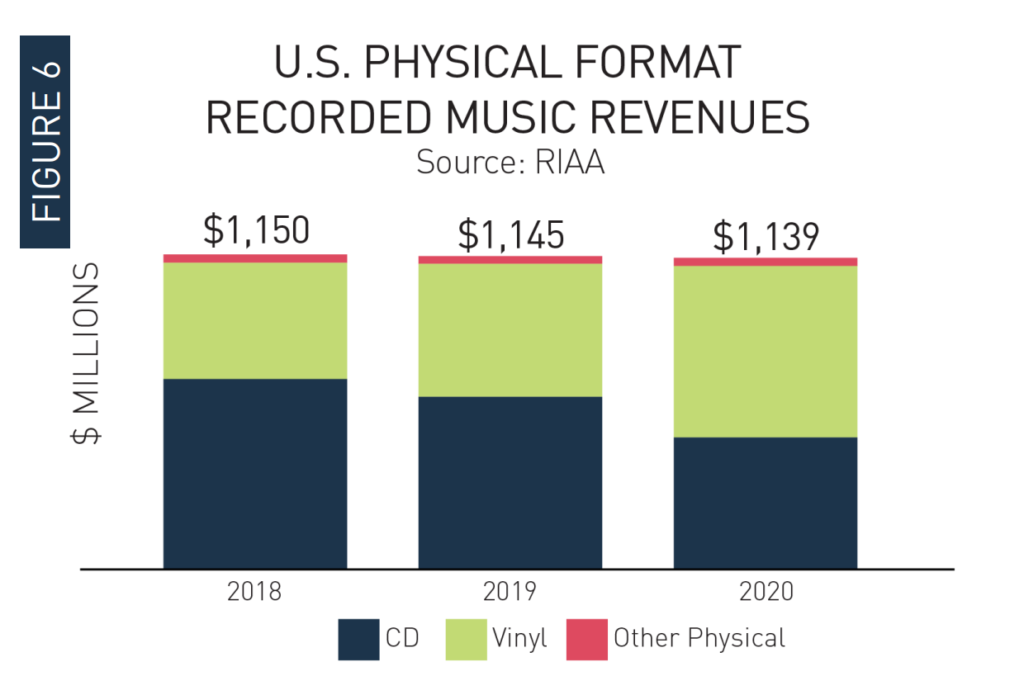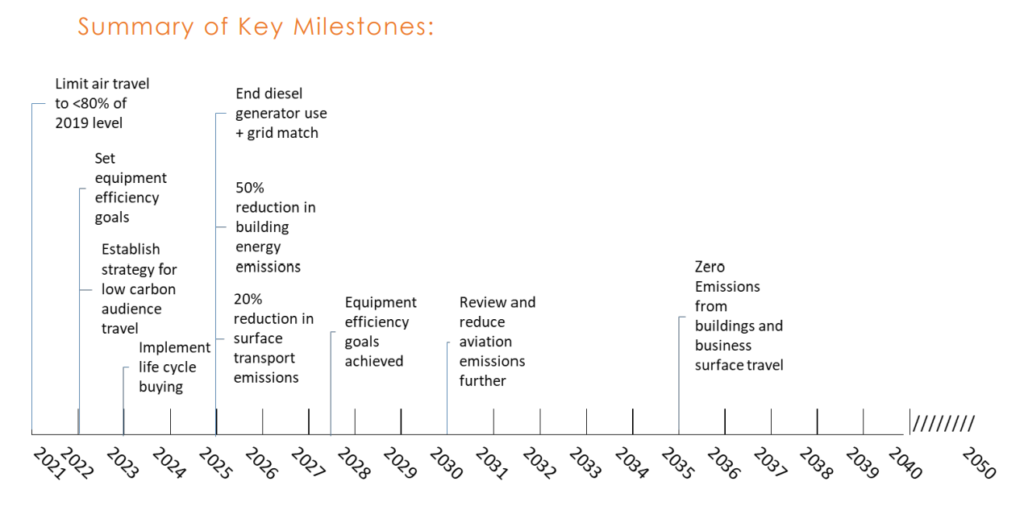How to Reduce the Music Industry’s Climate Impact
12 July 2022 – by Viktor Tachev Comments (0)
Reducing the music industry’s climate impact is a rarely raised yet highly-critical issue. Climate change research shows that the music industry takes a substantial toll on the environment – from the production of vinyl records and CDs to the carbon emissions footprints of streaming services and live concerts. The power to decarbonise the music industry is in the hands of four groups: producers, streaming companies, musicians and fans. Bands like Massive Attack and Coldplay are the leading examples.
Reducing Greenhouse Gas Emissions
The Global climate crisis demands a reduction in greenhouse gas emissions. But how can the music industry reduce its negative environmental footprint and own renewable energy is a big question.
How Does the Music Industry Contribute to Climate Change?
Before we can understand how the music industry can reduce its climate impact, we must understand the ways it has fuelled global warming.
Plastic Waste from Physical Music Mediums and Merchandise
The old-school music recording mediums, including vinyl and CDs, are again garnering popularity with the new generation of music lovers. For example, in 2020, vinyl record sales in the United States surpassed CD sales for the first time since 1986.

There is a growing trend among fans to buy their favourite band’s album on every physical medium possible (CD, vinyl and cassette) and collect posters and other merchandise. This practice, however, doesn’t guarantee a person’s “super-fan” status. It does, however, exacerbate the environmental impact of the music industry.
A single record made from plastic can take up to 1,000 years to fully decompose in a landfill. Also, its production consumes large amounts of energy.
Furthermore, due to the fast-fashion model that is dominant today, most new clothes are made from fossil fuel-based synthetic fibres that break down and enter our oceans.
Carbon Emissions from Live Tours and Streaming
While consuming music digitally instead of through physical mediums reduces the carbon footprint by up to 80%, streaming and the recent craze of selling music through NFTs aren’t sustainable. According to studies, the rise of streaming has increased the music industry’s emissions in the US from 140 million kilograms in 1977 to between 200 and 350 million kilograms in 2016.
Data centres and cloud services need power and cooling. As a result, they consume 1% of global electricity and generate over 350,000 tonnes of GHG emissions per year. The carbon footprint of our gadgets, the internet and the systems supporting them account for 3.7% of global emissions. This equals the airline industry’s share.
Next is the problem of live music. Artists tour worldwide on planes and transport their equipment by trucks or buses. And the fans follow them. The result is an excessive carbon footprint. Live music generates around 400,000 tonnes of GHG emissions annually in the United Kingdom alone. Moreover, today, the average touring DJ emits 35 tonnes of CO2 annually. This is over 17 times higher than the recommended carbon budget of approximately 2 tonnes of CO2 per individual.

How to Reduce Music Industry’s Climate Impact?
Reducing the climate impact of the music industry is possible through coordinated efforts from all involved groups.
Musicians
Musicians and bands should stop launching albums on all possible physical mediums to expand their profit streams.
Furthermore, they should reconsider the entire live touring process – from organisation to execution. Some of the measures recommended by the Tyndall Centre for Climate Change Research include adopting tour routes that minimise travel and transport, avoiding flying, using energy-efficient lighting and sound equipment and prioritising venues that rely on energy or produce renewable energy on-site. Installing renewable energy systems should be the choice. The organisation also said that bands should use their stage to raise awareness about the need to transition to a greener music industry. For example, they should advocate for a global music industry decarbonisation commitment, similar to the one in the UK.

Superstars like Billie Eilish and bands like Massive Attack and Coldplay are already trying to make a difference. However, Coldplay has been recently accused of greenwashing.
Producers and Industry Organisations
Music companies, producers and promoters have the most extensive resources to drive change and should be the engine behind the music industry’s decarbonisation.
In December 2021, Sony and Warner started leading by example by signing a climate crisis pact. The alliance pledges to reduce the music industry’s climate impact caused by artists touring worldwide and requires all members to commit to net-zero by 2050.
Change should also come on a micro level, similar to the cases of Ninja Tune and Green Vinyl, which aim to produce more sustainable vinyl and environmentally-friendly packaging.
Initiatives like Reverb’s Music Climate Revolution can also help. The organisation aims to educate every part of the music industry – from fans and artists to venue operators, producers, labels and studios – on how to reduce their climate impact. Similarly, DJs for Climate Action aims to raise the profile of environmental issues in the DJ industry. Additionally, K-pop 4 Planet works to connect K-pop lovers with environmental causes and promotes a more sustainable mindset.
Fans and Individuals
Music lovers should embrace greener ways of consuming music. In terms of physical assets, this means owning less or aiming to recycle, reuse, gift or resell their album copies.
Individuals should prioritise streaming music instead of buying physical copies. Furthermore, it is advisable to download playlists for offline listening instead of streaming nonstop. That way, people can minimise the 1.57 million tonnes of carbon emitted daily per person from content streaming.
Fans should also pressure their favourite musicians to change how they sell their music, tour and produce merchandise. More importantly, they should hold them accountable for the lack of commitment or potential greenwashing practices by fact-checking bands’ statements and actions.
Streaming Giants
Streaming companies should migrate to greener data centres and increase the use of renewable energy in their operations.
The Google Cloud platform, for example, states that it is carbon neutral and intends to power all of its data centres with clean energy by 2030. In 2019, Spotify migrated to the Google Cloud.
As of 2020, Amazon Web Services, the home of Apple Music, powers 65% of its operations with renewable energy.
Tencent, one of China’s leading cloud service providers, pledged carbon neutrality in its operations and supply chain by 2030.
While this is notable progress, music streaming companies have much more work left. Furthermore, the industry must pressure the nodes in their supply chains to decarbonise since most of its GHG emissions come from Scope 3.
The Key to Reducing the Music Industry’s Climate Impact: Collective Efforts
Most importantly, fans must be vigilant and hold their favourite performers accountable. Bands should use the stage they have to promote change. Tour managers should prioritise models that promote sustainability and reduce their carbon footprints. Streaming companies and producers should use their vast resources to empower the industry’s decarbonisation. However, these industry segments must act cohesively to enact meaningful change.
by Viktor Tachev
Viktor has years of experience in financial markets and energy finance, working as a marketing consultant and content creator for leading institutions, NGOs, and tech startups. He is a regular contributor to knowledge hubs and magazines, tackling the latest trends in sustainability and green energy.
Read more